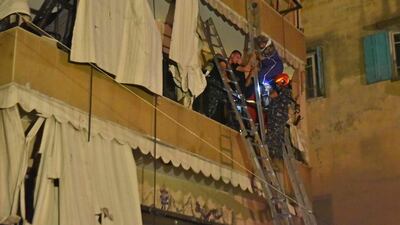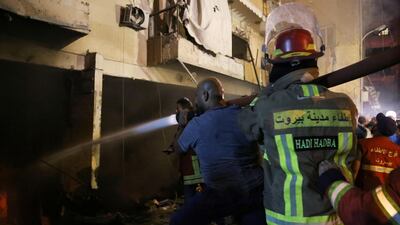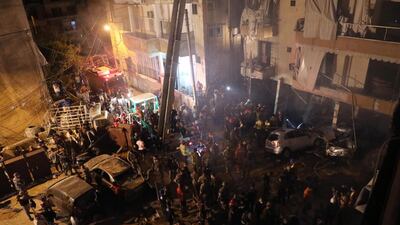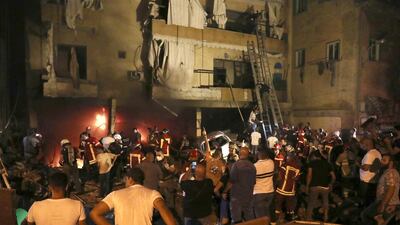A diesel tank at a bakery in Beirut’s Tariq Al-Jadida neighbourhood has exploded, killing four people and injuring dozens.
The Lebanese Red Cross confirmed the death toll, while the Al-Jadeed television channel reported that at least 30 people were injured.
"Two bodies and a number of wounded were taken to Al Maqasid Hospital as a result of the explosion of the diesel tank that caught fire this evening," said George Kittana, secretary-general of the Lebanese Red Cross.
Eyewitness Ali Ghannam said: "We were cleaning the street then suddenly a very strong explosion shook the place and everything starting falling down.
"A diesel or gasoline tank was blown in the air then fell down, causing fire and electricity cables to be cut, and people ran away. We still don't know the details."
The explosion reportedly panicked local residents and damaged a large number of neighbouring buildings.
The army cordoned off the blast site, a bakery, and evacuated residents who were trapped on the upper floors of the building.
Lebanon Civil Defence said the explosion caused a large fire which has been brought under control.
A security source told French news agency AFP the fire took hold in an underground storage area where there was also petrol.
The source said authorities arrested the owner, who manages one of the many private generator services that supply residents with electricity during Lebanon's frequent power outages.
Beirut governor Marwan Aboud told Al Jadeed that in the last few weeks the municipality had been looking for warehouses that could be in breach of the law or pose a danger to residential areas.
"We feared that such an accident could happen," Mr Aboud said.
He said about 100 sites had been identified as suspect. "We have ordered some of them to close and required others to put in place procedures to protect the public."
Lebanon is still suffering after August's huge explosion in Beirut port, which killed at least 190, injuring 6,500 and leaving 300,000 people homeless.
About 2,750 tonnes of ammonium nitrate stored at port exploded in what was one of the biggest non-nuclear blasts in history.
The eight-month-old government resigned after the blast, but no politician has apologised and the local investigation has yet to pinpoint responsibility for the disaster.
Former prime minister Saad Hariri has said he is a possible candidate to head a new government to stem the country's economic collapse.
French President Emmanuel Macron last month extracted a pledge from all political sides in the former French protectorate to back speedy government formation as part of a roadmap out of the crisis, but efforts so far have failed.
President Michel Aoun is to hold parliamentary consultations on naming a new premier on Thursday next week.
Even before the blast at Beirut port and the coronavirus pandemic, Lebanon was facing its worst economic crisis since the end of a 15-year civil war in 1990.















